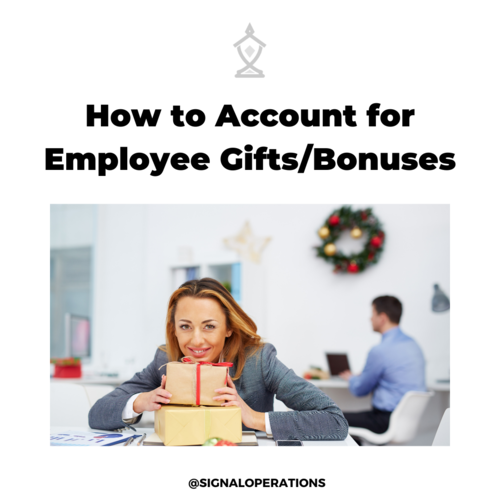How To Account For Employee Gifts/Bonuses
Some business owners show their employees their appreciation through gifts and bonuses, but how do you account for them? What’s taxed and what’s not?
This blog is here to answer all those questions and more.
So, how do you account for employee gifts/bonuses?
Cash Gifts/Bonuses
Many employees are very happy to receive bonuses for holidays, but not many of them are aware of the taxes that come along with cash gifts/bonuses.
When it comes to taxes, cash or near-cash gifts are always considered a taxable benefit for your employees. What’s a near-cash gift, though? A near-cash gift is something that acts as cash or can easily be converted into cash. This largely has to do with things like gift cards.
“Annual and long-service cash gifts are considered to be separate and may be received in the same year. For example, an employee could receive up to $1,000 worth of non-cash gifts in the same year if half was an annual gift and the other half was for the fifth anniversary.” - The Balance Small Business
Non-Cash Gifts/Bonuses
Most gifts that are non-cash or non-near-cash are not taxable if the total combined value annually is less than $500. If they exceed $500, everything beyond $500 must be included in the employee’s income. For example, if you give them $700 worth of gifts, $200 of that is considered a taxable benefit ($700 - $500 = $200)
The Government of Canada website explains a few basic rules that apply to gifts and bonuses in Canada These rules factor into both cash and non-cash gifts/bonuses. Some of those include:
Gifts have to be given for special occasions or holidays, such as Christmas, birthdays, weddings, etc.
If the gift is taxable, you must include it in your employee’s T4 in box 14, “Employee Income” as well as in the “Other Information” area under code 40.
Valueless or very low-value items such as snacks, mugs, t-shirts, etc are not counted as taxable items.
Alternative Ways to Give Back to Your Employees
Another way to show thanks to your employees besides personal gifts or bonuses, is through things such as staff parties. Many gifts and bonuses are taxable, but a social event for employees where the cost is $100 per person or less is not considered taxable.
You can have up to six events per year to write off 100% of the cost. You must invite all your employees for it to be considered a full write-off.
After all, who doesn’t love a staff party? Not only do you get to give back to your employees, but you also benefit through the way it helps build your employees’ trust and collaboration.
If you decide that you want to give out gifts and bonuses, just make sure you understand the taxes behind what you are giving and receiving. If you need any gift ideas, check out this blog!
What do you like to give your employees during the holidays? Let us know in the comments below!
If you need some more help figuring this all out or need any other bookkeeping/accounting help, book a discovery call.


